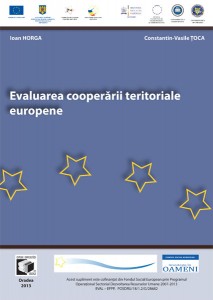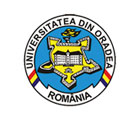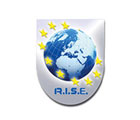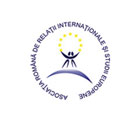The Evaluation of Cross-Border Cooperation in the EU
Secțiunea curentă: Members
16 iunie 2015
Constantin-Vasile ȚOCA

University assistant dr. Constantin Vasile Ţoca, member of the department of International Relations and European Studies at the University of Oradea. Member of the Institute for Euroregional Studies and the Romanian Association of International Relations and European Studies. As part of the experience in working with European funds and also local and Euroregional funds, project manager in 4 projects of which: Leonardo da Vinci project entitled Dezvoltarea de competenţe în doemniul administraţiei publice (Developing competences in the field of public administratio) in partnership with the university of Debrecen, funded by the European Comission through the Lifelong Learning Policy; a project entitled Să pregătim un viitor comun: Aglomeraţia Comunităţilor Debrecen – Oradea – 700.000 (2020) (Building a future together: Urban aglomeration Debrecen – Oradea – 700 000 (2020)) funded by the Oradea City Hall and other 15 participations as project member of which we mention (Boosting Innovation through Capacity Building and Networting of Science Centre in the SEE Region).
Member of the editorial staff for Eurolimes, Romanian International Relations and European Studies Journal, Romanian Security Studies Joaurnal. Scientific contribution can be attested by over 35 articles presented at international conferences and published in books and journals indexed in international data bases, 2 personal books published and 3 coordonated books.
The area of interest and research is concentrated in the following fields: cross border cooperation, evaluation of programs and European public policy, international organisations, European institutions and policies, communication and negotiation, international relations sociology.
Relevant publications
 Constantin – Vasile Ţoca, Romanian-Hungarian cross-border cooperation at various Territorial levels, with a particular study of the Debrecen-Oradea Eurometropolis : (European grouping of territorial cooperation-EGTC), Editura Universităţii din Oradea, Oradea, 2013, ISBN 978-606-10-1160-5
Constantin – Vasile Ţoca, Romanian-Hungarian cross-border cooperation at various Territorial levels, with a particular study of the Debrecen-Oradea Eurometropolis : (European grouping of territorial cooperation-EGTC), Editura Universităţii din Oradea, Oradea, 2013, ISBN 978-606-10-1160-5
Abstract: Cross boder cooperation at the Romanian-Hungarian border after 1989 has see many shapes and forms depending on the evolution of European cooperation structures as, on the level of the communities from Debrecen (HU) and Oradea (RO) there are functional NUTS levels. Thus we can discuss about cooperation in different fields along the Romanian – Hungarian border.
Constantin – Vasile Ţoca, Evaluarea cooperării transfrontaliere la frontierele României-studiu introductiv, in Ioan Horga, Constantin – Vasile Ţoca, Florentina Chirodea, Evaluarea cooperării transfrontaliere la frontierele României, Editura Primus, Oradea, 2013, ISBN 978-606-8318-73-8
Cross border cooperation constitutes an essential dimention in each state, as shown by Romania’s example where there are two types of boders: internal and external EU borders, with interesting developments in the field of cross border cooperation with neighbouring countries.
 Ioan Horga, Constantin Vasile Ţoca, Evaluarea cooperării teritoriale europene, Editura Universităţii din Oradea, Oradea, 2013, ISBN 978-606-10-1168-1
Ioan Horga, Constantin Vasile Ţoca, Evaluarea cooperării teritoriale europene, Editura Universităţii din Oradea, Oradea, 2013, ISBN 978-606-10-1168-1
Abstract: European territorial cooperation is a new instrument design to give member states opportunities for new cooperation directions in common interest field that can lead to sustainable development and an increase in living standards for citizens of target countries. Alongside territorial cooperation, evaluation of the process can offer an enlarged view of cooperation and lead to ideas on how to improve it.
Constantin – Vasile Ţoca, Edina Lilla Meszaros, The existing EGTC models of territorial cohesion and their applicability in the Debrecen – Oradea Agglomeration, Editor Dr. Kozma Gabor, Department of Social Geography and Regional Development Planning, University of Debrecen, HU ISSN 2062-8870 (Print), HU ISSN 2062-8889 (Online), p.23.40
2012
Good practice examples offered by the new European structures based on the EGTC instrument represent solutions that are both viable and applicable. The existance of a sustained collaboration at the Romanian – Hungarian border, between the cities of Oradea and Debrecen, can become the first EGTC cooperation in this area, taking advantage of functional EGTC structures that offer valuable information as good practice examples.
Constantin-Vasile Ţoca, Adrian-Claudiu Popoviciu, The European Grouping of Territorial Cooperation (EGTC), Instrument of Cross-border Cooperation. Case Study Romania – Hungary, în revista Eurolimes, Book 10, Autumn 2010, Oradea University Press, ISSN: 1841 – 9259, p. 66-75
Abstract: The evolution of cooperation at the European borders has had an impact on the border between Romania and Hungary. After the fall of communism, cross border cooperation between Romania and Hungary has developed through European funds; cooperation between the cities of Oradea and Debrecen has presented great potential in common interest fields through the use of the new EGTC instrument.
Constantin Ţoca, Comparative SWOT analysis of the Debrecen – Oradea cross – border communities, în Media and European Diversty, edit. L. Şoproni, I. Horga, Ed. Bruylant, Bruxelles, 2010, ISBN 978-2-8027-3090-3, p. 203-209
Abstract: The SWOT analysis on cross border communities from Debrecen (Hungary) and Oradea (Romania) presents a large aray of indicators and 6 relevant dimensions of common strategic interest for the communities in Oradea and Debrecen that permit new forms of cooperation based on new European instruments for common and sustained development.







